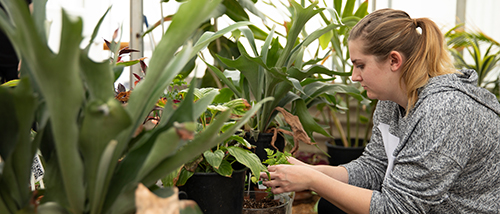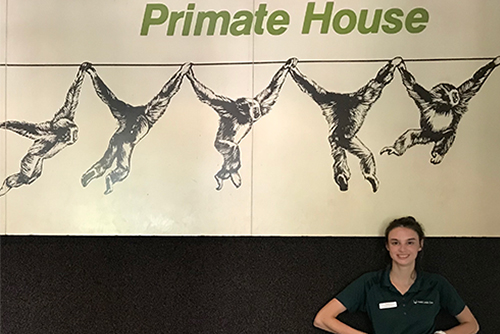Zoology, Botany, & Evolutionary Biology
Continue to main content
Zoology, Botany, and Evolutionary Biology (BS) Degree Map
Explore the courses you'll need to complete your degree.
Outcomes & Careers
-
$95k
Microbiologist
According to the Bureau of Labor Statistics, the mean annual salary for a microbiologist is $95,200.
-
$100k
Biological Scientist
According to the Bureau of Labor Statistics, the mean annual salary for a biological scientist is $100,440.
-
$111k
Environmental Scientist
According to the Bureau of Labor Statistics, the mean annual salary for an environmental scientist and geoscientist is $111,310.
The Zoology, Botany, & Evolutionary Biology curriculum includes coursework to prepare you for career paths in research, education, public policy and ecology, and evolutionary biology. You’ll complete a minimum of 120 credit hours to complete this degree, including the general education requirements and at least 39 senior division hours.
A minimum 2.0 GPA in the major and overall are required to graduate with a B.S. in Organismal, Ecological, and Evolutionary Biology. “Critical Courses” are italicized and bolded. Data shows that students who have completed this course in the first two years and have earned the noted grade are most likely to complete this program of study.
Required Courses:
- BY163 Evolution & Ecology (4)
- BY173 Cell & Organismal Biology (4)
- By283 Genetics (4)
- BY389 Career Development in Biology (2)
- CH184 General Chemistry I Lab (1)
- CH185 General Chemistry I (3)
- MI101 Introduction to Microcomputer Applications (3)
Choose one math course:
- MA116 Precalculus A (3)
- MA137 Precalculus (5)
- MA139 Applied Calculus (3)
- MA140 Analytical Geometry & Calculus I (5)
Experiential Learning Requirement (2 hours):
- BY580 Development of Instructional Materials (3)
- BY582 Internship in Biology (1-3)
- BY585 Biology Field Studies (1-6)
- BY587 Experience in Museum Curation (1-3)
- BY591 Biological Research (1-6)
Zoology, Botany, & Evolutionary Biology Option Required Courses
- BY320 Zoology (4)
- BY321 Introduction to Evolutionary Biology (3)
- BY322 Introduction to Biological Collections (3)
- BY330 General Ecology (4)
- BY360 Plant Biology (4)
- BY420 Biogeography (3)
OR - BY421 Phylogenetic Systematics (4)
Choose 6 hours:
- BY460 Ethnobotany (3)
- BY461 Plant Physiology (3)
- BY462 Field Botany - Fall Flora (3)
- BY463 Field Botany – Spring Flora (3)
- BY464 Native Aquatic Plants (3)
- BY565 Plant Diversity Collections (3)
Choose 6 hours:
- BY312 Comparative Anatomy (3)
- BY471 Invertebrate Zoology (3)
- BY472 Parasitology (3)
- BY473 Entomology (3)
- BY474 Aquatic Entomology (3)
- BY475 Ichthyology (3)
- BY476 Herpetology (3)
- BY477 Mammalogy (3)
- BY478 Ornithology (3)
- BY481 Vertebrate Adaptations (3)
Choose 6 hours:
- BYxxx, EVxxx, GT 300 level and above
Non-Biological Requirements:
- MA223 Elementary Probability & Statistics (3)
- Social and Behavioral Sciences – 6 hours
- Constitution Requirement – 3 hours
- Written Communication – 6 hours
- Oral Communication – 3 hours
- Natural Sciences – 7 hours (from two disciplines, one to include a lab)
- Mathematics – 3 hours
- Humanities & Fine Arts – 9 hours (from at least two disciplines)
- Additional requirements – 5 hours (to include UI100 for native students)
- Civics examination
First Year
Fall Semester (15-17 Hours)
- UI100 (1)
- BY163 (4)
- CH184/185 (4)
- MA116/137/139/140 (3-5)
- MI101 (3)
Spring Semester (16 Hours)
- BY173 (4)
- EN100 (3)
- MA223 (3)
- General Education (3)
- General Education (3)
Milestone: achieve a target cumulative GPA of 3.0
Second Year
Fall Semester (14 Hours)
- BY283 (4)
- BY330 (3)
- General Education (3)
- General Education (3)
Spring Semester (14 Hours)
- BY321 (3)
- BY322 (3)
- BY389 (2)
- General Education (3)
- General Education (3)
Milestone: achieve a target cumulative GPA of 3.0
Third Year
Fall Semester (16-17 Hours)
- BY436 or BY438 (3-4)
- BY320/020 (4)
- General Education (3)
- Elective (3)
- Elective (3)
Spring Semester (16 Hours)
- BY360 (4)
- BYxxx Upper Level elective (4)
- Elective (3)
- Elective (3)
- Elective (2)
Milestone: achieve a target cumulative GPA of 3.0
Fourth Year
Fall Semester (14 Hours)
- Experiential Learning Course (2)
- BYxxx elective (3)
- General Education (3)
- Elective (3)
- Elective (3)
Spring Semester (15 Hours)
- BYxxx Upper-level elective (3)
- General Education (3)
- Elective (3)
- Elective (4)
- Elective (3)
Milestone: achieve a target cumulative GPA of 3.0
A “Milestone” signifies a significant stage for a student in the completion of a degree.
What will it cost?
Become a Redhawk.
Do more than dream about the future. Take the first steps to make it all happen.
Hands-on Learning
You’ll gain hands-on real-world experience through required 80 hours outside the classroom, gaining experience conducting, presenting, and publishing research.
Alumna
"I’ve been going to the Saint Louis Zoo since I was a little kid, and the Primate House was my favorite part to go to every time. When I decided on my major and found out I needed an internship, the Saint Louis Zoo was the first place I thought of. I get to learn all about the species that they care for in the Primate House and how different each of them are. I am seeing how zoos work and how much they do for the animals and the conservation work of animals all around the world."
Emma Ahern

Getting the Job
Your education is just one piece to launching an extraordinary career. Once you’ve mastered the material, you still have to find the job you want, make the right connections, and sell your knowledge and experience—if all this is giving you anxiety, don’t panic. SEMO’s Career Services office is here to help you with the next step. Our boldly supportive faculty will provide the expertise and support you need, so you’re landing your dream job in no time.
Cape Girardeau, Missouri 63701

